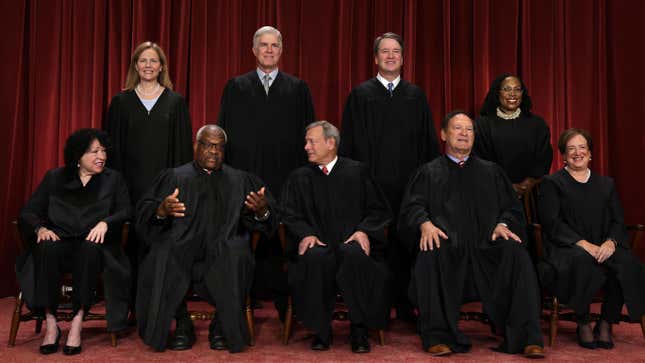The Supreme Court Could Hear Not One, But Two, Abortion Cases This Term
The nine unelected Justices are back in action. Here's what fresh hell awaits us.
JusticePolitics

It’s the first Monday in October, which (unfortunately) means that it’s the start of a new Supreme Court term. If you somehow forgot, the court did a lot of damage in the last two years by overturning Roe v. Wade, dramatically expanding gun rights in 2022, and taking a wrecking ball to civil rights protections earlier this year. It could hear two suits involving abortion, as well as some other doozies.
One abortion case is already sitting in the court’s queue of cases to consider, but it’s not clear when we’ll find out if they’ll take it. With the Dobbs case that overturned Roe, the justices put it on their private “conference” schedule at least 15 times before voting to take it up.
Here are the cases we’re watching:
Abortion pills
Back in November, a right-wing Christian legal firm filed a federal lawsuit on behalf of anti-abortion doctors against the Food and Drug Administration, arguing that the agency had improperly approved the abortion drug mifepristone way back in 2000. The case is pure nonsense and the lawyers filed it in a district where they knew they’d get Judge Matthew Kacsmaryk, a former religious liberty lawyer.
Kacsmaryk wanted to pull mifepristone from the market entirely, but, in August, an appeals court said the statute of limitations had passed to challenge the 2000 approval and limited the case to the question of whether abortion pills can be sent by mail and prescribed through 10 weeks of pregnancy, rather than seven—which was the original cutoff before the FDA approved 10 weeks in 2016. (An April Supreme Court order blocked any changes to access during litigation.) It would essentially mean rolling back the clock seven years on mifepristone access, despite medical research showing it’s safe to take later in pregnancy and prescribe via telemedicine.
The FDA has already appealed the most recent ruling to the Supreme Court asking it to strike down the proposed changes to mifepristone, so now we wait to see if the court accepts the case. It seems likely that they will, which could set up a decision in June 2024, in the thick of the presidential election where Republicans are facing questions about their plans to ban abortion nationwide.
-

-

-

-

-

-

-

-

-

-

-

-

-

-

-

-

-

-

-

-

-

-

-

-

-

-

-

-

-

-

-

-

-

-

-

-

-

-

-

-








































